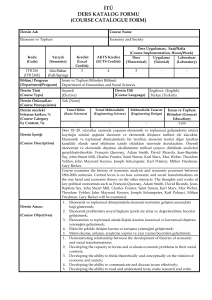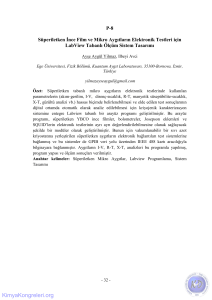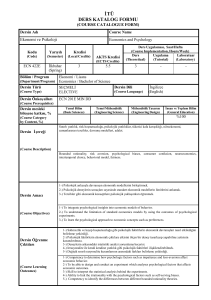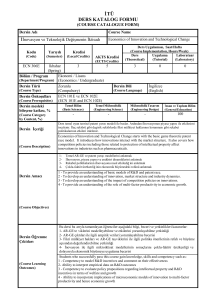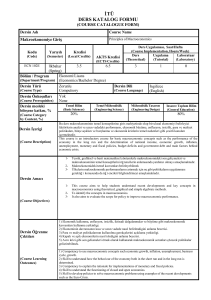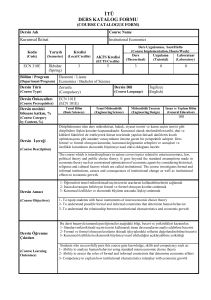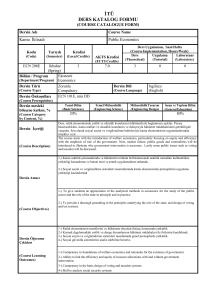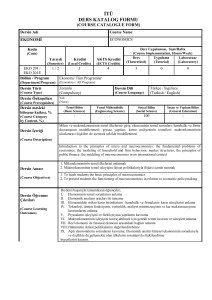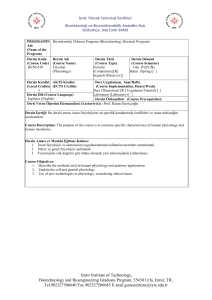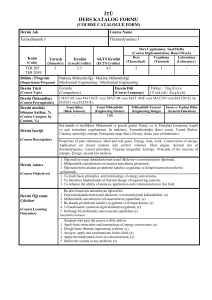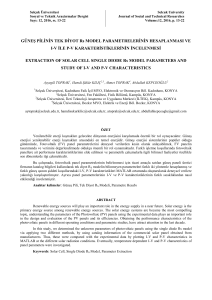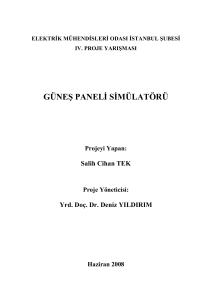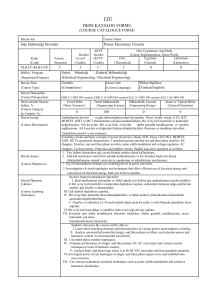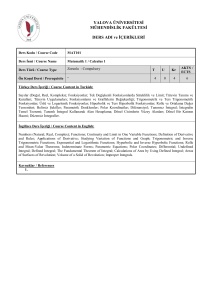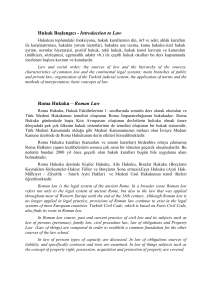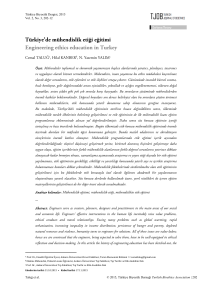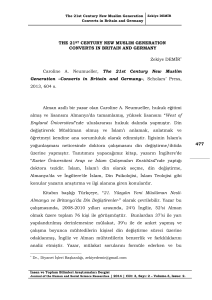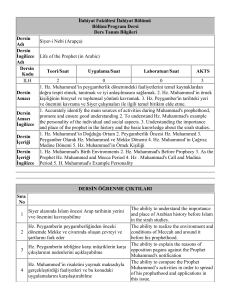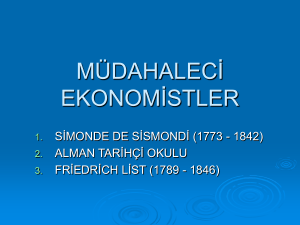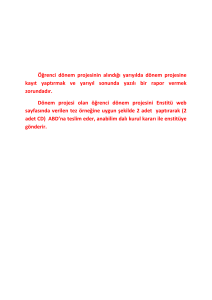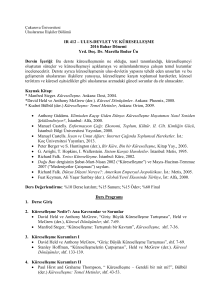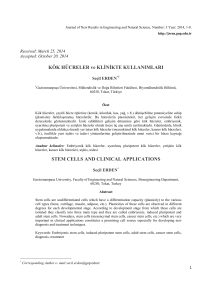ITB 216 Economy and Society
advertisement
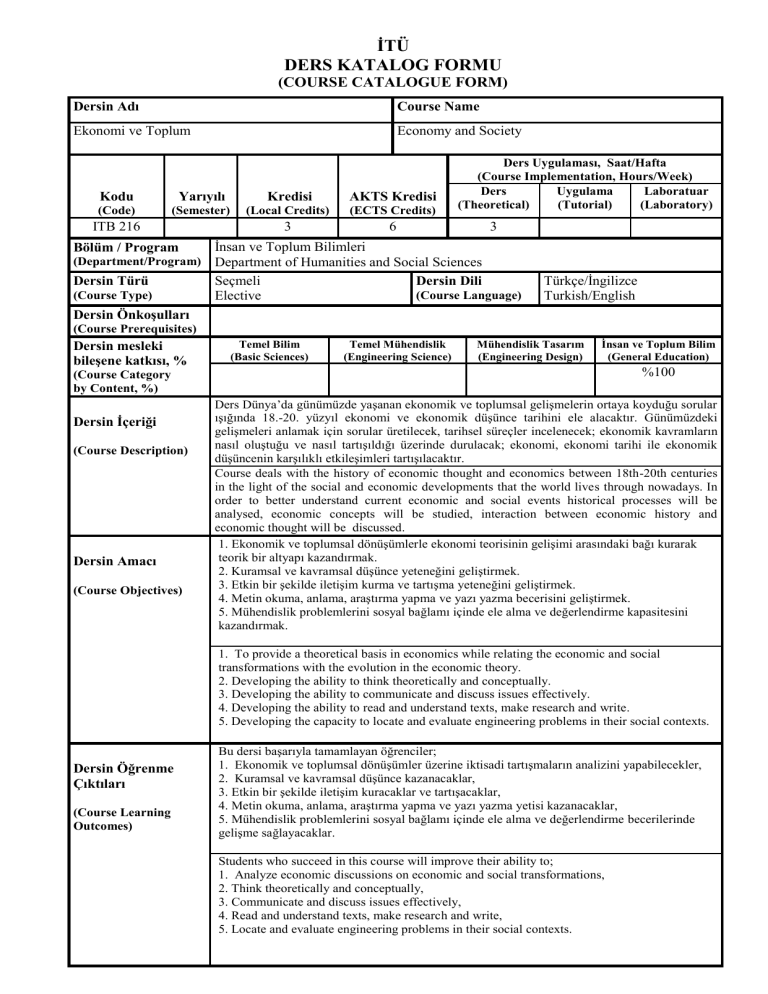
İTÜ DERS KATALOG FORMU (COURSE CATALOGUE FORM) Dersin Adı Course Name Ekonomi ve Toplum Economy and Society Kodu Yarıyılı Kredisi AKTS Kredisi (Code) (Semester) (Local Credits) (ECTS Credits) 3 6 ITB 216 Bölüm / Program (Department/Program) Dersin Türü (Course Type) Ders Uygulaması, Saat/Hafta (Course Implementation, Hours/Week) Ders Uygulama Laboratuar (Theoretical) (Tutorial) (Laboratory) 3 İnsan ve Toplum Bilimleri Department of Humanities and Social Sciences Seçmeli Dersin Dili (Course Language) Elective Türkçe/İngilizce Turkish/English Dersin Önkoşulları (Course Prerequisites) Dersin mesleki bileşene katkısı, % Temel Bilim (Basic Sciences) Temel Mühendislik (Engineering Science) Mühendislik Tasarım (Engineering Design) İnsan ve Toplum Bilim (General Education) %100 (Course Category by Content, %) Dersin İçeriği (Course Description) Dersin Amacı (Course Objectives) Ders Dünya’da günümüzde yaşanan ekonomik ve toplumsal gelişmelerin ortaya koyduğu sorular ışığında 18.-20. yüzyıl ekonomi ve ekonomik düşünce tarihini ele alacaktır. Günümüzdeki gelişmeleri anlamak için sorular üretilecek, tarihsel süreçler incelenecek; ekonomik kavramların nasıl oluştuğu ve nasıl tartışıldığı üzerinde durulacak; ekonomi, ekonomi tarihi ile ekonomik düşüncenin karşılıklı etkileşimleri tartışılacaktır. Course deals with the history of economic thought and economics between 18th-20th centuries in the light of the social and economic developments that the world lives through nowadays. In order to better understand current economic and social events historical processes will be analysed, economic concepts will be studied, interaction between economic history and economic thought will be discussed. 1. Ekonomik ve toplumsal dönüşümlerle ekonomi teorisinin gelişimi arasındaki bağı kurarak teorik bir altyapı kazandırmak. 2. Kuramsal ve kavramsal düşünce yeteneğini geliştirmek. 3. Etkin bir şekilde iletişim kurma ve tartışma yeteneğini geliştirmek. 4. Metin okuma, anlama, araştırma yapma ve yazı yazma becerisini geliştirmek. 5. Mühendislik problemlerini sosyal bağlamı içinde ele alma ve değerlendirme kapasitesini kazandırmak. 1. To provide a theoretical basis in economics while relating the economic and social transformations with the evolution in the economic theory. 2. Developing the ability to think theoretically and conceptually. 3. Developing the ability to communicate and discuss issues effectively. 4. Developing the ability to read and understand texts, make research and write. 5. Developing the capacity to locate and evaluate engineering problems in their social contexts. Dersin Öğrenme Çıktıları (Course Learning Outcomes) Bu dersi başarıyla tamamlayan öğrenciler; 1. Ekonomik ve toplumsal dönüşümler üzerine iktisadi tartışmaların analizini yapabilecekler, 2. Kuramsal ve kavramsal düşünce kazanacaklar, 3. Etkin bir şekilde iletişim kuracaklar ve tartışacaklar, 4. Metin okuma, anlama, araştırma yapma ve yazı yazma yetisi kazanacaklar, 5. Mühendislik problemlerini sosyal bağlamı içinde ele alma ve değerlendirme becerilerinde gelişme sağlayacaklar. Students who succeed in this course will improve their ability to; 1. Analyze economic discussions on economic and social transformations, 2. Think theoretically and conceptually, 3. Communicate and discuss issues effectively, 4. Read and understand texts, make research and write, 5. Locate and evaluate engineering problems in their social contexts. Ders Kitabı (Textbook) Diğer Kaynaklar (Other References) Seçilmiş yazılar Selected writings Steven G. Medema and Warren J. Samuels (ed.),The history of economic thought : a reader, London : Routledge, 2003. Ernesto Screpanti and Stefano Zamagni, An outline of the history of economic thought, (translated by David Field), Oxford : Clarendon Press, 1993. Eric J. Hobshawm, The age of revolution, 1789-1848, Cleveland, World Pub. Co. 1962. Eric J. Hobsbawm, The age of capital, 1848-1875, London : Abacus, 1975. Stephen A. Marglin and Juliet B. Schor (eds.), The Golden age of capitalism: reinterpreting the postwar experience, Oxford : Clarendon Press ; New York : Oxford University Press, 1990. Gérard Duménil and Dominique Lévy, Capital resurgent: roots of the neoliberal revolution, (translated by Derek Jeffers), Cambridge : Harvard University Press, 2004. Alfredo Saad Filho, and D. D. Johnston (eds.), Neoliberalism: A Critical Reader, London: Pluto Press, 2005. John Bellamy Foster and Fred Magdoff, The Great Financial Crisis, Causes and Consequences, Monthly Review Press, 2009. Ödevler ve Projeler (Homework & Projects Laboratuar Uygulamaları (Laboratory Work) Bilgisayar Kullanımı (Computer Use) Diğer Uygulamalar (Other Activities) Başarı Değerlendirme Sistemi (Assessment Criteria) Faaliyetler (Activities) Yıl İçi Sınavları (Midterm Exams) Kısa Sınavlar (Quizzes) Ödevler (Homework) Projeler (Projects) Dönem Ödevi/Projesi (Term Paper/Project) Laboratuar Uygulaması (Laboratory Work) Diğer Uygulamalar (Other Activities) Final Sınavı (Final Exam) Adedi (Quantity) 2 Değerlendirmedeki Katkısı, % (Effects on Grading, %) %30-%30 1 %40 DERS PLANI Hafta 1 2 3 4 5 6 7 8 9 10 11 12 13 14 Konular İktisat Teorileri ve Toplumsal Dönüşümler 1929 Büyük Bunalım, Nedenler ve Sonuçlar 2. Dünya Savaşı Sonrası Ekonomi Politikaları ve Toplumsal Dönüşümler Neoliberal Dönem Ekonomi Politikaları ve Toplumsal Dönüşümler 2008 Ekonomik ve Finansal Kriz 18. Yüzyıl’da Ekonomik Analiz: Fizyokratlar Laissez-faire Ekonomisi : Bir Sistem Kurucu olarak Adam Smith 19. Yüzyılda Ekonomik Analizler ve Politikalar 1: Robert Malthus 19. Yüzyılda Ekonomik Analizler ve Politikalar 2: David Ricardo Liberal siyasal iktisat ve yaygınlaşması: Jean-Baptiste Say 19. Yüzyılda Ekonomik Dönüşüm ve Toplumsal Eleştiri: Sismondi 19. Yüzyılda Toplumsal Mesele: Ütopyacı Sosyalistler Eleştirel Siyasal İktisat: Karl Marx Ekonomik Krizler ve Kriz Analizleri Dersin Çıktıları I-V I-V I-V I-V I-V I-V I-V I-V I-V I-V I-V I-V I-V I-V COURSE PLAN Weeks 1 2 3 4 5 6 7 8 9 10 11 12 13 14 Topics Economic theories and social transformations 1929 Great Depression, Causes and Effects Economic Policies and Social Transformations after the II. World War Economic Policies and Social Transformations in the Neoliberal period Economic and Financial Crisis of 2008 Economic Analysis in the 18th century: Physiocracy Laissez-faire economics: Adam Smith as a system builder 19th century economic analysis and policies 1: Robert Malthus 19th century economic analysis and policies 2: David Ricardo Liberal political economy and its diffusion: Jean-Baptiste Say Economic transformation in 19th century and its social critics: Sismondi 19th century social question: Utopian socialists Critical Political Economy: Karl Marx Economic Crisis and its analysis Course Outcomes I-V I-V I-V I-V I-V I-V I-V I-V I-V I-V I-V I-V I-V I-V Dersin ………………………………. Programıyla İlişkisi Programın mezuna kazandıracağı bilgi ve beceriler (programa ait çıktılar) Katkı Seviyesi 1 2 3 a b c d e f g h i j k 1: Az, 2. Kısmi, 3. Tam Relationship between the Course and ………………………………..…Engineering Curriculum Program Outcomes Level of Contribution 1 2 3 a b c d e f g h i j k 1: Little, 2. Partial, 3. Full Düzenleyen (Prepared by) Yrd. Doç Dr. Alp Yücel Kaya Tarih (Date) 20.04.2009 İmza (Signature)
